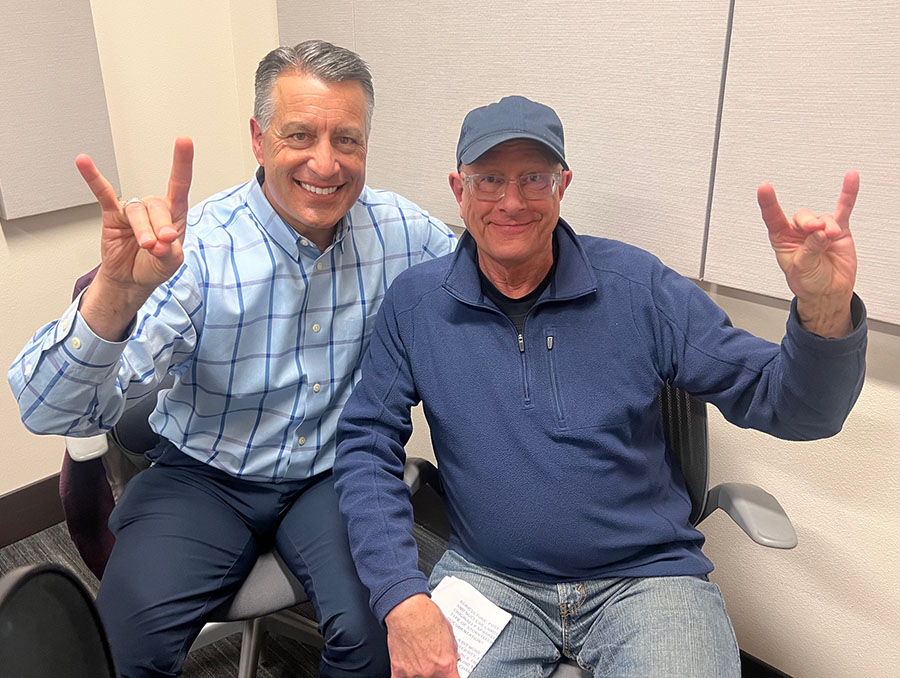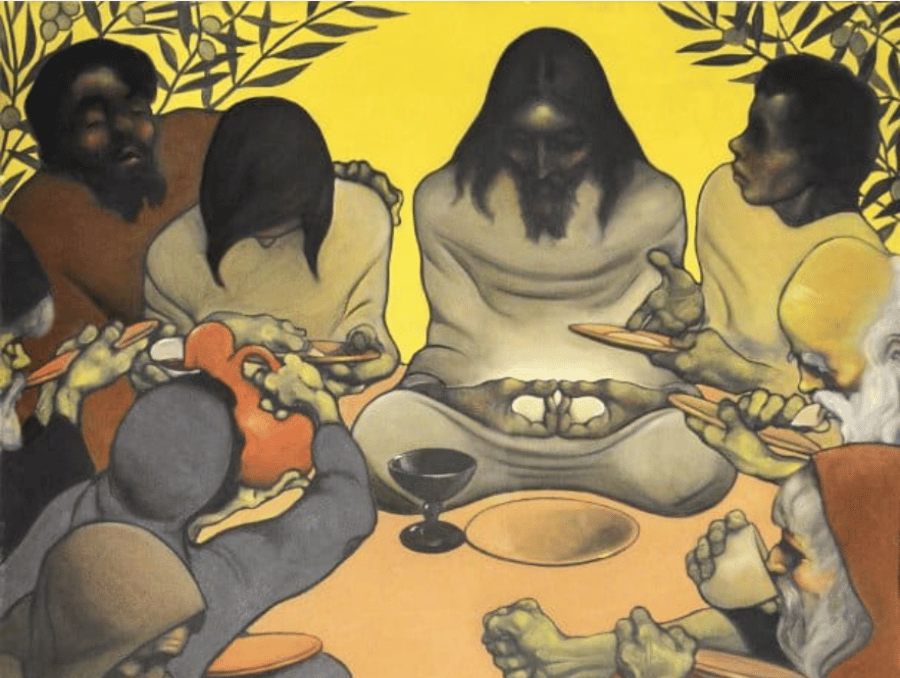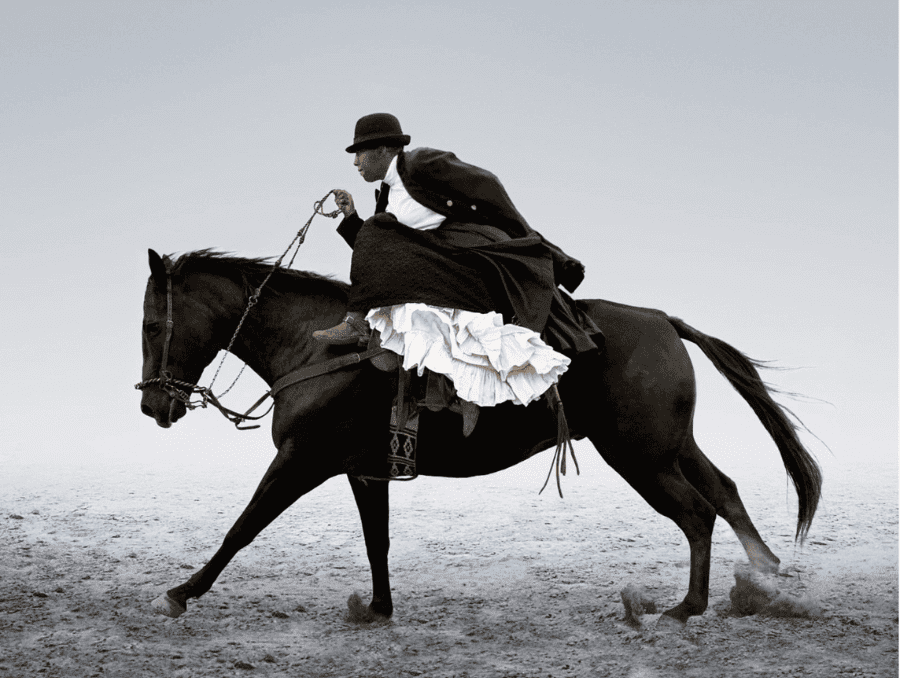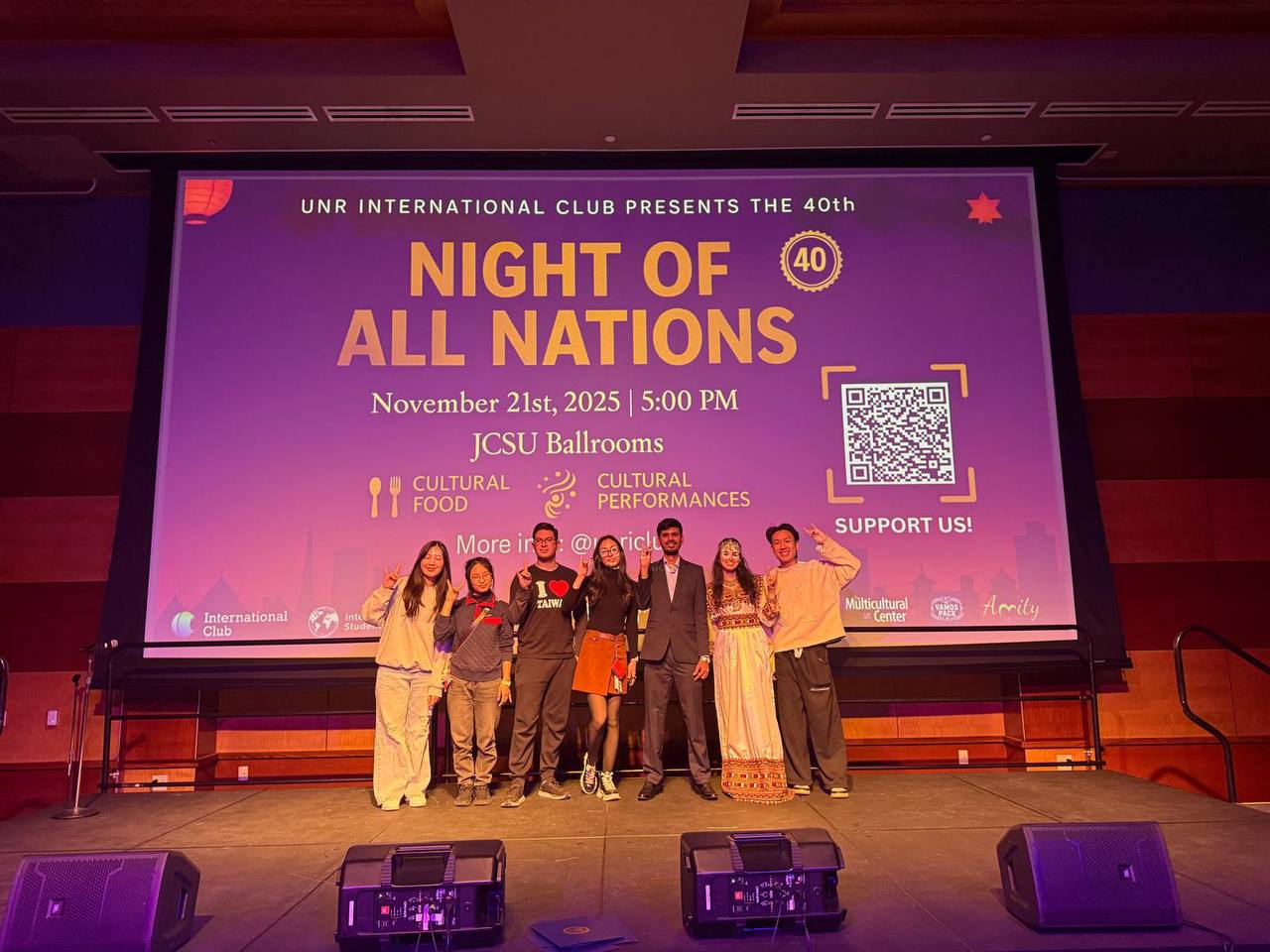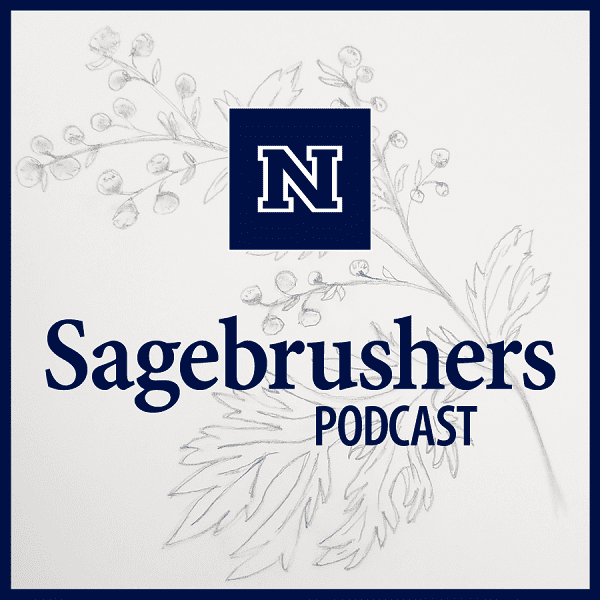
In this episode of Sagebrushers, University of Nevada, Reno President Brian Sandoval visits with Foundation Professor Peter Goin. Goin, who has worked on the University campus since 1984, is a photographer, author and visual historian.
During the episode, Sandoval and Goin explore his work documenting the visual history of Lake Tahoe, the Nevada Test Site and the Black Rock Desert. Goin also shares how photography education has evolved and the impact that smartphones have had on the art form.
Sagebrushers is available on Spotify, Apple Podcasts and other major podcast platforms, with new episodes every month.
Sagebrushers – S3 Ep. 7 – Foundation Professor Peter Goin
Join host President Brian Sandoval as he and Foundation Professor Peter Goin discuss his work as a photographer, educator and visual historian of Nevada landscapes.
Peter Goin: Now photography is integrated across all of the humanities and sciences in dramatic ways, so we become ever more useful, ever more integrated into the collective scientific world.
President Brian Sandoval: This is Sagebrushers, the podcast of the University of Nevada Reno. Welcome back, Wolf Pack Family. I'm your host, University President Brian Sandoval. Almost 200 years ago, Lake Tahoe was the domain of the Washoe people. What has happened to the Lake’s identity since the onset of the Euro-American conquest of the American West, today I'm joined by Foundation Professor Peter Goin, whose research, books and photography explore this topic. Join us now for a discussion about Lake Tahoe's identity and evolution through the medium of photography. So, let's get started.
Professor Peter Goin is the author of more than 22 books of Western America landscapes. Two of his books offer the most comprehensive view of the lake and its environment. Goin’s photographs have been exhibited in more than 50 museums nationally and internationally, and he's the recipient of two National Endowment for the Arts Fellowships. He also is the recent recipient of the Nevada System of Higher Education Regent's Creative Activities Award. Today's podcast is being recorded at our Reynolds School of Journalism on our University's campus. Professor Goin, welcome to Sagebrushers. I'm excited to share with our listeners some of your compelling work and experience.
Peter Goin: It’s a pleasure to be here.
President Brian Sandoval: This is going to be a really good episode. Let's jump into your process, no pun intended, Lake Tahoe, but let's jump into your process for creating two books on Lake Tahoe. You and your research team spent nearly two decades discovering original images of the lake. How did you begin that process and what did you learn?
Peter Goin: We have to put in context that this project started when the internet was in its infant stages. You couldn't really search for images back then. We could do email, but we didn't really have the resources online. You had to visit every archive. We had to visit museums, we had to go to university special collections departments. We even went into people's homes and went through their personal collections trying to see as many photographs as absolutely possible about the history of the lake. I have probably viewed more than 40,000 photographs of Lake Tahoe and who knew that many existed, but most of them are what we call vernacular images, common every day. Not so many from professional photographers except in the very early stages of Lake Tahoe's identity. So, to find more images, we even went so far as to apply for and receive one of the first National Endowment for the Humanities grants here at the University, particularly from someone in the arts where we offered to digitize family photographs so that people would bring their photographs to us, secretly, so we could see what they had, and then we would scan them for free for them, a service that's very hard to get and then we could use some of those in our study to be as comprehensive as possible. Then, we look at those photographs and we say ‘Okay, now we have this huge compendium of images. How are we going to then identify this history of the lake?’ One of the most important things about that is that the visual history of Lake Tahoe precedes the scientific inquiry of the lake by 60-some years, so that this visual history is paramount in the identity of Lake Tahoe.
President Brian Sandoval: So, what is the oldest photograph that you were able to find of Lake Tahoe?
Peter Goin: That is exactly one of the things we're trying to find. Scholars will argue this point: Do we talk about when it was made? When it was published? When is that actual moment? But basically, we're looking at around 1862. It's the earliest image when you think about photography's origin, really in 1827 is the earliest image we know of globally, 1827. So, by 1862, that's not that much later that we start having images made of the lake. And it was a stereographic view, which is where you have two images side by side when put into a viewer reveals an illusion of three-dimensionality, and that image has been reprinted so many times. What's interesting about that image is a lot of times people don't understand why there are two images. We have two eyes, two images, if that makes sense. So, they would take one of the images out and then expand it, and so it kind of distorted what was that original intentionality of creating a dimensional view of the lake.
President Brian Sandoval: So, your books examine photography's role in the evolution of Lake Tahoe. Can you explain more about what those two books are and how they're connected?
Peter Goin: After all of this work, the first major book, I mean it is the fifth book technically, but the first major book is called ‘The Nature of Lake Tahoe, a Photographic History, 1860 to 1960.’ People oftentimes say ‘Why that date range?’ Well, 1860s, around that time when photographers were starting to visit the lake and 1960 might seem random, but that's actually the transition point from black and white to color photography. Once color photography became dominant, the nature of the way photographs were made changed. They didn't have the same kind of professional approach, more vernacular, more from the home, more from people visiting. It was so common then that people could use color, which is unto itself fugitive, which means it decays. It doesn't have the permanence. So, if you look at photographs that were in the 1960s, they're going to be faded or not as visually relevant because they were just made for fun or for someone standing against the backdrop.
So, that's the nature of Lake Tahoe. When I was working on that history, based on those many thousands of photographs, I realized that to really understand those images, I had to go to where those photographs were made. So, then I go there and I look at the photograph or try to find that spot, and then what happens is you say, ‘Well, you know what would be helpful is if I made another photograph of that same view that would help the scholarly appraisal of those original photographs and correct incorrect data that was represented throughout Lake Tahoe's history.’ Amazing number of places are misidentified around the lake, and there's a general confusion, ‘Oh, this is obviously going to be at Meeks Bay, but it could be Glenbrook.’ People don't always understand that. But this growing number of photographs that were the original photograph, then the rephotograph, it became obvious I needed to do a rephotographic history so that we could look at the then and now. And by doing that, it became amazing to look at how the lake has changed. A lot of people think, oh, Lake Tahoe, it's a wilderness. It's this beautiful wilderness. They don't even realize how much the lake has changed. So, that comparative analysis really provides substantial information for people who are truly interested in landscape change.
President Brian Sandoval: Just fascinating, and we'll talk in a minute where people can get your books, but so your body of work seeks to document human-altered landscapes, including the BlackRock Desert, California agriculture, post-mining landscapes and nuclear landscapes. What originally sparked your interest in this type of storytelling and documentation?
Peter Goin: Well, coming to Nevada in 1984, I discovered that not many people represented Nevada visually. What I realized is that Nevada has been overlooked and perceived as an aired wasteland. I did some research for you, one of your predecessors, Governor Russell, 1952, and I'm going to quote this. He said: ‘We had long ago written off that terrain is a wasteland, and today it's blooming with atoms.’ He was, of course, celebrating the founding of the Nevada Test Site. Well, that's an interesting way of thinking about Nevada. But for me, being a professor at the University of Nevada, I felt we needed to represent the Nevada Test Site, particularly not an easy process to gain access to those lands. After about six months with the entire congressional delegation helping me get there, because my approach was educational, not political, I was given access to the Nevada Test Site as the very first artist allowed access where my work was not then perceived as requiring security review.
And so that's where the book ‘Nuclear Landscapes’ came out, and it is still to this very day exhibited throughout the world, and there's been more than 500 written articles about that work, bringing Nevada to the forefront, representing Nevada, demonstrating our great visual history. It reminds me of a story that Harry Reed once said. I ran into him at a coffee shop here in town when he was running for his last election, and I've known him for years and years, and he had his security detail and I was just going to say hello to him, and I couldn't get through his security detail, but he saw me and he called me out. And so the security detail kind of let me speak to him, and I walked up to him to greet him, and he said, ‘I bet you this professor from the University of Nevada, Reno knows how many mountain ranges there are in the state.’ Well, that's a really difficult position. Good thing I knew the answer. Do you?
President Brian Sandoval: I don't.
Peter Goin: Okay, now you will. 314.
President Brian Sandoval: 314 mountain ranges. You heard it here, ladies and gentlemen. So how about, you know you also Black Rock Desert? I mean, obviously, there's interest out there, given Burning Man and such.
Peter Goin: The Black Rock Playa is one of the most important deserts in all of the world. It's ranked around 40th, whatever those rankings are. But this is an amazing landscape. You can see the curvature of the earth. It is such a historical presence and identity for this state. It is the place where if you go, not talking about Burning Man just yet, but if you go and sit in the middle of the desert when there's no wind, you can actually, if there is no wind, hear your blood flow in your veins and your heartbeat. It's the same as an anechoic chamber where you get absolute quiet and you can hear your own body. You can do that in the Black Rock Desert. It's a phenomenal location. So, I've done all of this work, and then of course, Burning Man comes along. So, the work that I did preceded Burning Man and then included Burning Man. But the Black Rock Desert is so much a part of Nevada's identity. Of course, transported into global fame because of the Burning Man Festival.
President Brian Sandoval: So, tell me a little bit more about your time at the University. I understand you've been here since 1984. You've got to be up there in terms of rank.
Peter Goin: I think I've reached the top of the rank.
President Brian Sandoval: So, how did you end up here and how did the curriculum for photography change during that time?
Peter Goin: I appreciate that question. When I came here in 1984, we had a Quonset hut with the photography program. When I came here, my first class that I taught had seven students, seven. But, when I came here, it was analog photography. That means chemical. We worked with chemicals, and the facility needed to be rebuilt, rebuilt the program, we went from seven students in my first class to more than 150 each semester. So, that was a huge expansion. The reason for that was because we were moving away from analog, because that's what was happening, into the digital world of photography. That included a more complex digital image management and information design, which means now photography is integrated across all of the humanities and sciences in dramatic ways. So, we become ever more useful, ever more integrated into the collective scientific world. And that's been a phenomenal opportunity. And students from our program, they go all over the world and all different kinds of jobs from being a forensic photographer here in Washoe County to working for Larry Ellison as a web designer to you name it. Our students have gone into those places. So, it's been quite dramatic.
President Brian Sandoval: Now we're proud of our students. And, just out of curiosity, obviously you've been here on campus a long time. You talk about analog; you talk about digital photography. What have iPhones done to photography?
Peter Goin: Yeah, that's a really great question. So, iPhones, people think, ‘Oh, well, that's the end of photography.’ Well, when photography came, people said, that's the end of painting. The difference is that iPhones create greater facility, greater use of a different platform, a different method of communicating. Of course, we still have professional cameras. We still have the means to do larger format printing, which is a great addition. Panoramic photographs, large photographs. But, the iPhone means everybody now is a photographer, and they want to learn how to use it and compose it. And so, it's a really dynamic increase in how we communicate and how many photographs are made every minute globally in the billions.
President Brian Sandoval: Wow. Wow. So, we're getting short on time, but I want to get one more question in. So, our University Library has created a special digital collection of your work. Can you tell us a bit more about your overall collection and the body and legacy of work that you've gifted to the public trust? And also talk about your book real quickly and where it's accessible.
Peter Goin: The two books are available. Amazon, they're available. They're very easy to find. So they are very available. The importance of the work here at Special Collections is that I feel it's my responsibility as a faculty member to contribute my work to the public trust so that this work that I've done for my whole career has an opportunity for future generations to benefit from it. It's about the work and the history of Nevada. I probably have been making images of Nevada more than anyone in our history. They belong to this state, and so they are in the public trust.
President Brian Sandoval: Unfortunately. That is all the time we have for this episode of Sagebrushers. Thank you for joining us today. It's been a wonderful episode.
Peter Goin: My pleasure. Thank you.
President Brian Sandoval: Thank you. So, join us next time for another episode of Sagebrushers as we continue to tell the stories that make our University special and unique. Until then, I'm University President Brian Sandoval, and go Pack!
